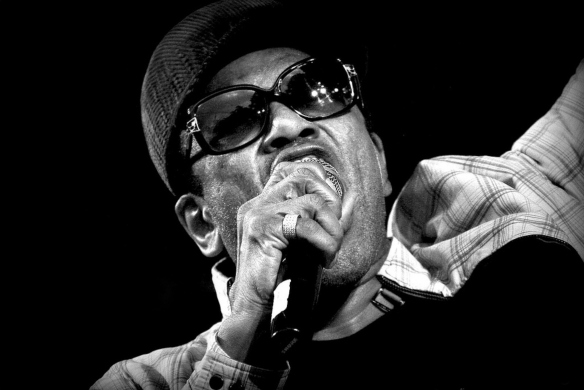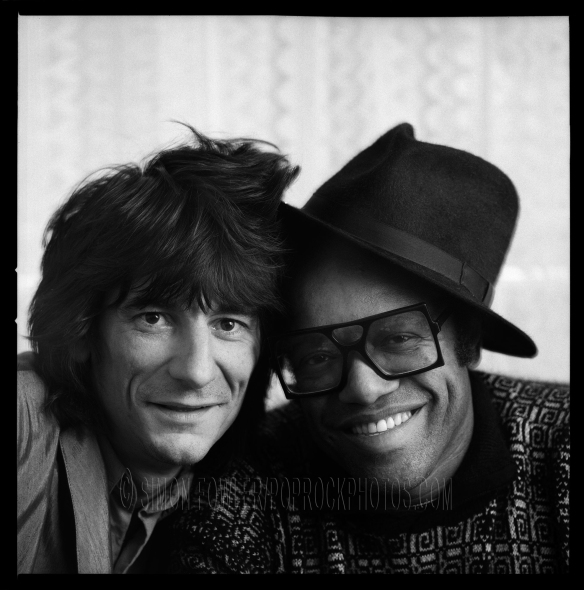It’s All Over Now( tout est fini, maintenant) est un célèbre hit des Rolling Stones. Mais à l’origine, il n’était autre que celui du soulman, Bobby Womack. Un titre prémonitoire. Car il pourrait faire office d’épitaphe. Bobby Womack, chanteur, guitariste et songwriter( compositeur) américain de soul et rythm’n’blues, est décédé, vendredi soir, à l’âge de 70 ans.
Celui qu’on surnomme « The preacher » (le prêcheur), était l’auteur de tubes planétaires tels que That’s The Way I Feel About Cha » et Woman’s Gotta Have It . Parmi les admirateurs de la première heure figurent Keith Richards, Rod Stewart, Stevie Wonder, Damon Albarn (Blur, Gorillaz, The Good, The Bad and The Queen) ou encore Ronnie Wood. Fils d’un métallurgiste, Bobby chante dès son plus jeune âge avec ses cinq frères dans un groupe de gospel monté par ses parents et qui joue dans les églises de la région de Cleveland. Le groupe se fait appeler Womack Brothers lorsqu’il enregistre le 45 tours en 1954, puis change de nom pour s’appeler The Valentinos. Sam Cooke les repère et les fait signer sur son propre label, SAR.
The Valentinos se séparent à la fin des sixties, laissant notamment une chanson It’s All Over Now, dont la reprise par le groupe The Rolling Stones va obtenir un succès mondial en 1964. “ J’étais très déçu quand les Rolling Stones ont repris It’s All Over Now. C’était comme ils avaient vole ma chanson. Mais, plus tars, j’ai cessé d’être déçu quand nous( lui et Sam Cooke) avions reçu notre premier chèque de royalities. Cela a tout changé… » confiera plus tard, Bobby Womack au Guardian.
Après la mort de Sam Cooke, Bobby Womack se marie avec sa veuve et travaille comme musicien de studio et compositeur à Memphis, où il collabore entre autres avec Aretha Franklin et Wilson Pickett. Sa carrière solo commence véritablement en 1968 et continue malgré des problèmes de santé lié à son addiction à la cocaïne durant les années 1980. Le 2 janvier 2012, il annonce à la presse qu’il est atteint de la Maladie d’Alzheimer ; il avoue ne pas se souvenir des paroles de ses chansons ni du nom de ses collaborateurs.
Parmi les tweets réagissant à la mort de Bobby Womack, celui de Robbie Wood, guitariste des Rolling Stones, était émouvant : « Je suis triste d’apprendre le décès de Bobby Womack. L’homme qui pouvait vous faire pleurer quand il chantait. Et là, il m’arrache des larmes. ». MC Hammer, le grand rappeur de San Francisco, lui rendra hommage : « Repose en paix, ô légende de la soul music. Celui qui chantait du fond de son âme ! ».
Bobby Womack, Royalty of the Soul Era, Dies at 70
Sonya Kolowrat, Mr. Womack’s publicist at XL Recordings, said further details about the death were not immediately available.
Mr. Womack, nicknamed the Preacher for his authoritative, church-trained voice and the way he introduced songs with long discourses on life, never had the million-record success of contemporaries like Pickett, Marvin Gaye, Al Green and Otis Redding. His sandpaper vocal style made him more popular in England, where audiences revere what they consider authentic traditional American music, than in the United States.
But the pop stars of his time considered Mr. Womack royalty. His admirers included Keith Richards, Rod Stewart and Stevie Wonder, all of whom acknowledged their debt with guest performances on albums he made in his later years.
Mr. Womack’s 2012 album, “The Bravest Man in the Universe,” is an avant-garde collaboration with a new generation of musicians. It combines old and new material by Mr. Womack, which the British producer Richard Russell and the alternative rock songwriter Damon Albarn mixed with programmed beats, old gospel recordings, samplings of Cooke and other sounds, some played backward or sped up.
The album earned favorable reviews on both sides of the Atlantic. Rolling Stone ranked it No. 36 on its list of the 50 best albums of the year.
“I don’t understand a lot of the things they were doing,” Mr. Womack said of his collaborators in an interview with The Guardian. “I would never have dreamed of doing stuff like that, but I wanted to relate to the people today.”
Mr. Womack had his first major hit in 1964. He was under contract with Cooke’s SAR label when he wrote the song, “It’s All Over Now,” and recorded it with his group, the Valentinos, which consisted of him and four of his brothers. The song was slowly rising on the R&B charts when Cooke told him that a British band called the Rolling Stones had liked it so much that they planned to record it, too.
The song became the Stones’ first No. 1 single in Britain and their first international hit, while the Valentinos’ version sank.
“I was very upset about it,” Mr. Womack said in an interview. “It was like, ‘They stole my song.’ ”
Later, he said, as Cooke had predicted he would: “I stopped being upset when we got our first royalty check. That changed everything.”
Many of his songs were recorded by others, often with greater success than his own renditions. Janis Joplin included “Trust Me” on her album “Pearl,” the J. Geils Band recorded “Lookin’ for a Love,” which reached the Top 40 in 1972, and Pickett recorded “I’m a Midnight Mover” and 16 other Womack songs.
In 1971 Mr. Womack played guitar on, and helped produce, Sly Stone’s most ambitious album, “There’s a Riot Goin’ On,” now a soul classic.
Bobby Dwayne Womack was born on March 4, 1944, in Cleveland. His father, Friendly, was a steelworker and part-time Baptist minister. His mother, Naomi, played the organ for the church choir. Under their father’s direction, Bobby and his brothers Cecil, Curtis, Friendly Jr. and Harry formed a gospel group, the Womack Brothers, which began touring in 1953.
The Womacks were raised to believe that hell awaited gospel singers who sang pop music, Bobby told interviewers, and at first they resisted Cooke’s summons. They made several gospel records for SAR before changing their name to the Valentinos and recording their first secular songs, a decision that caused a lasting rift with their father, until shortly before his death in 1981.
By 17, Mr. Womack was the lead singer of the new group, the youngest guitarist in Cooke’s touring band, and an emerging hit songwriter. His song “Lookin’ for a Love,” a remake of a gospel composition, became a modest hit for the Valentinos on the R&B chart in 1961 (a decade before the J. Geils version). Royalties from “It’s All Over Now” alone reportedly made him financially secure for most of his life.
Then, when he was 20, Mr. Womack’s career hit a wall. The Dec. 11, 1964, shooting death of Cooke, during a dispute with a Los Angeles motel owner, left Mr. Womack without a mentor or a record label. By most accounts, his decision to marry Cooke’s widow, Barbara Campbell, just a few months after the shooting, made him something of a pariah in the music world.
Unable to land a new record contract, Mr. Womack left the Valentinos and settled into backup work for contemporaries like James Brown, Aretha Franklin, Joe Tex, Joplin and a young, little-known Jimi Hendrix. His solo career began to revive in the late 1960s and early ’70s. Two albums he recorded for United Artists in the 1970s are considered soul classics: “Communication” (1971), which yielded the hit “That’s the Way I Feel About ‘Cha,” and “Understanding” (1972), which included “Woman’s Gotta Have It.”
In 1981 he released two of his most critically acclaimed albums, “The Poet” and its sequel, “The Poet II,” which featured several duets with the soul singer Patti LaBelle. He joined the Rolling Stones to sing a duet with Mick Jagger on “Harlem Shuffle,” on the Stones’ 1986 album, “Dirty Work.”
In 2009 Mr. Womack was inducted into the Rock and Roll Hall of Fame. His marriage to Ms. Campbell, as well as two subsequent marriages, ended in divorce. His survivors include two sons, Truth and Vincent. Although hip-hop stars frequently sampled the soul music of his era, Mr. Womack refused most requests by others to use his recordings in their work, he told a British interviewer in 2004. Despite his well-publicized marital problems and struggles with drugs and alcohol, he said, he remained a gospel singer at heart. “Me being from the old school, I would not say ‘bitch’ on a record,” he said. “I couldn’t face my mother if I did.” In nytimes.com( link: http://www.nytimes.com/2014/06/28/arts/music/bobby-womack-songwriter-and-musician-dies-at-70.html?&_r=0)
The reaction following the death of the soul legend, Bobby Womack
I’m so sad to hear about my friend Bobby Womack ~ the man who could make you cry when he sang has brought tears to my eyes with his passing.
MC HAMMER
RIP to the « Soul Legend » who sang from his Soul !!!#BobbyWomack « A Woman’s Gotta have it » !!! #RIP BobbyWomack
Calvin Richardson
R.I.P. Mr. Bobby Womack. You were always one of the greatest in my book. They’ll never be another like you!!
Rose mcgowan
Oh no! Bobby Womack died. He was a fierce artist. Listened to Across 110th Street last night. Really bummed. No voices like his anymore.




Because I used to love him
But it’s all over now.
Tu avait crée en moi des moments forts Bobby Womack quand j’etais au lycée Repose en paix
un grand poète est au ciel .
avec émotions j ai écouter ses titres
rip